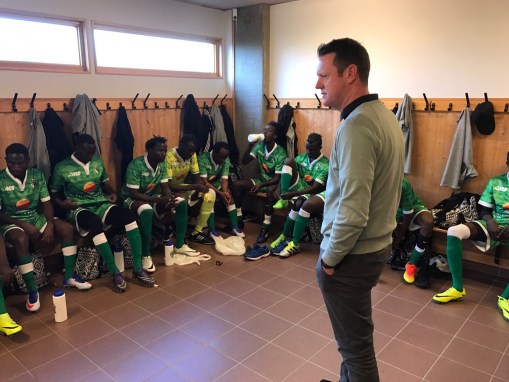 To say the team has improved on the field is maybe one of the greater underestimations I may have made in my almost-40 years on this planet.
To say the team has improved on the field is maybe one of the greater underestimations I may have made in my almost-40 years on this planet.
The football is unrecognizable from the hurried chatter and enthusiasm that kicked up the unbreathable dirt in the blazing heat of refugee camp Djabal in 2012.
At that time, we somehow selected a group of 16 individuals from the 60 hopeful players who attended that camp and we embarked on a journey that would lead us on an unlikely route from Chad to Iraqi Kurdistan, and, finally and thankfully, the unlikely setting of a unique, beautiful, and “guardian angel”-inhabited city in the middle of Sweden named Östersund.
What is also almost unfathomable is the growth and strength that these young men have garnered on their unlikely and remarkable path to being everyone’s favorite “other” football team.
As Coach, the football part, of course, makes me happy: the team’s ability to play was always there but without knowing what it looked like outside of the confines of a dirt pitch and a makeshift ball, the team needed a little gentle polishing, to remove the coarse exterior and reveal the shiny brilliance that lay beneath.

The boys’ commitment and dedication to learn made improvement a given and despite all the odds being firmly stacked against them, the team got a little better each and every day.
There is unquestionably still a long way to go in our football evolution and the early results and performances in Iraq and Sweden may have understandably created bewilderment for those in the competitive circuit that gave us a chance to move into the spotlight, but we continued to work hard and with each camp progressed, as we continued on our path to the top of our own special mountain!
It’s very easy to knock something down, but it takes a long time to construct something beautiful.
After each game, I ask “How did we play?” and I get nothing but honesty: “We did better today, Coach!”… “We need to pass the ball more, Coach”… “Mal koiz [“no good”], Coach.” I usually nod in agreement and try to realign to how we’ve progressed from our original starting point back on those sandy dirt pitches.
We are on a very special journey as a group. The improvement we have made on the field is enormous but pales in significance to the progress we have made off the field.
As we conduct our post camp meetings with each player, there is a resounding message that keeps coming back over and over. Sometimes it’s verbally communicated and sometimes it’s communicated simply through the sadness, tinged with hope, that wells in the players’ eyes.
They play for Darfur. They play for every child that remains in those horrific camps. sitting, waiting, praying for a better chance in life.
They play for their wives whom they love, their sons and daughters whom they miss so much that their bodies hurt and can’t sleep at night. Children whom they haven’t seen since they made the impossibly brave decision to try to forge a life outside of the camps so that one day they might share a better future for their family.
They play for Mum and Dad and brothers and sisters, many of whom gave the ultimate sacrifice to lead these young players out of Darfur.
They play for tomorrow and the hope they can go home and live lives like you and me, where we sleep without consideration with our loved ones under the safety of our own roof each night.
Keep supporting their play. It brings them nothing but joy and hope and I’ve seen it with my own eyes; impossible just takes time.
Special thanks to Alan and Judith Barker, our resident Östersund guardian angels.
